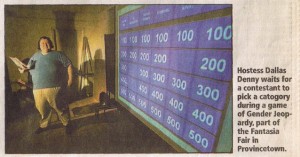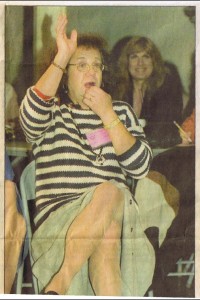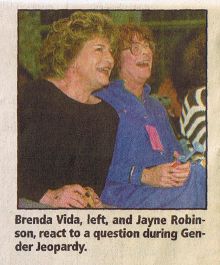Out of the Closet, With Style (1999)

©1999 by Felix Carroll
Source: Carroll, Felix. (1999, 21 October). Out of the closet—with style: Cross-dressers find safety, community at Fantasia Fair. Cape Cod Times, B1, B3.
When I attended my first Fantasia Fair—I believe the year was 1992 there were perhaps a half-dozen transsexuals, myself included, out of some 125 participants. It’s sometimes difficult to know how people identify, but I would guess today about one-third of the attendees cross-lived full-time. Certainly the “we’re all heterosexuals here” Tri-Ess mentality is long gone from the Fair. Unfortunately, Felix Carroll, the author of this article, didn’t understand how varied the attendance was. To him, everyone was a crossdresser. Aside from that, though, it’s not a bad article. I do wish it didn’t consist almost entirely of one-sentence paragraphs.
I wasn’t interviewed by Carroll, but my picture appeared on the first page, so I include it here. I was “Dalix Trebek,” hostess of Gender Jeopardy.
Out of the Closet—With Style
Cross-dressers Find Safety, Community at Fantasia Fair
By Felix Carroll
PROVINCETOWN —This is a week in Provincetown filled with a lot of laughs, a lot of learning and a lot of leg.
But for many, there have been huge social, practical and psychological hurdles to overcome in order to get here.
Lisa Mitchell and her husband had been married a little more than a year when she arrived home from work early one afternoon seven years ago and her world suddenly changed.
She opened the door and knew something was amiss.
“When she came in, I tried to jump into the next room and get changed,” her husband said.”She was suspicious. She thought I was with another woman. She looked high and low and didn’t find anyone.
“Eventually what I told her was, ‘I’m the other woman.'”
Dressed in a dark blouse with a white scarf and some blush and lipstick, “Elise,” as the Rhode Island man calls himself when cross-dressing, had his wife Lisa on his arm as the two strolled the streets of Provincetown Monday night.
“You think you really know someone,” Lisa said, referring to the day when she discovered “Elise.” “Now, sometimes I think I accept it more than Elise does.”
 This week, Provincetown is hosting Fantasia Fair, the longest run-fling transgender event in North America. The event, which has drawn about 150 cross-dressers from all over the world, began Sunday and runs through this Sunday. It includes seminars, workshops, entertainment and parties.
This week, Provincetown is hosting Fantasia Fair, the longest run-fling transgender event in North America. The event, which has drawn about 150 cross-dressers from all over the world, began Sunday and runs through this Sunday. It includes seminars, workshops, entertainment and parties.
And, importantly, it includes men dressing as women—and, to some extent, women dressing as men—and feeling safe about it.
Many of the stories are the same.
‘I’ve been dealing with this since I was 6 or 7,” said Elise. ‘You try on your mom’s clothes or your sister’s clothes and it goes on from there. And you think you’re the only person on the planet that does this.”
Largely still scorned or laughed at with impunity, cross-dressers see themselves as possibly the country’s most marginalized minority group.
‘fransgender has come to represent not only heterosexual males, but some gays, lesbians, transsexuals and people in the process of changing from one gender to another.
“We’re not hiding anymore,” said Pamela Geddes, a father, husband, and professional from Canada, dressed in a red wig, with a blouse and skirt. “We are claiming our rights.”
Indeed, many Fantasia Fair participants have begun to actively lobby members of Congress on issues such as employment non-discrimination and inclusion in legislation involving hate crimes and marriage.
Oddly enough, as opposed to drag queens, many cross-dressers say they don’t seek attention.
“We really just want to be able to blend in,” said “Phyllis,” a cross-dresser from the Cape. ‘The biggest compliment you could give a cross-dresser is to say ‘No one noticed you.’,,
Reclaiming a history
Miqqi Gilbert, a professor of philosophy at York University in Toronto, is one of the few participants at Fantasia Fair who is “out” in all aspects of his life. He sometimes dresses as a woman when teaching.
 He likens the transgender movement to that of the gay and lesbian movement of a generation ago.
He likens the transgender movement to that of the gay and lesbian movement of a generation ago.
“When the gay rights movement began,” Gilbert said, “one of the first things that had to be done was the re-acquisition of one’s history. Just as the gay community has done that, we are in the process of doing that.
“If you don’t have a history,” he said,”you don’t have an identity.”
Indeed, cross-dressers played a role in the Stonewall riot which helped galvanize the gay rights movement in the late 1960s, Fair participants noted.
Throughout history, cultures have had transgender people among them, Gilbert said, and have even placed them into positions of power.
Too examples, said David Prok, a college professor from Cleveland, and a speaker at Fantasia Fair, are witch doctors in Africa and shamans in North America.
Many of the participants in the fair are married with children. Most come from middle America and lead otherwise normal lives.
“I come here with my wife’s approval, support and love,” Pamela said.
But many, like Pamela and Elise, keep their cross-dressing to themselves and their spouses when back home. That requires leading dual lives for fear of losing their job, friends and family.
That makes Fantasia Fair, now in its 25th year, truly a relaxing getaway.
“We let it out and take it for a walk,” said Gilbert.
Participants of the Fair also come for one-on-one counseling. For some, the issues can be admittedly large and deep. Some, however, want help merely with things as simple as applying make-up and matching a wardrobe with a given occasion.
A different breed
Provincetown, of course, has its own share of men dressing as women. But the people that attend Fantasia Fair are decidedly a different breed from the drag queens that perform along Commercial Street.
“A drag queen dresses for fun and spoof,” said Prok. “A cross-dresser does it because it’s an intimate part of their essential self for them to assume the mantle of womanhood.”
The Swiss psychologist Carl Jung called “anima.”
“It’s part of the subconscious that responds to the feminine part of every human being,’ said An Kane, founder of the Maine-based Outreach Institute for Gender Studies and a cross-dresser. “This is a matter of males dealing with a part of the psyche that never gets the light of day in this culture.”
Most Fair participants meet with others like them in their own local areas. Elise, with the help of his wife, managed to find the Tiffany Club, a cross-dresser group, near where they live.
Most transgender events, however, are confined to the closed spaces of hotels and homes.
“But basically, it’s just a bigger closet,” Elise said. “Provincetown is not a closet at all because basically you can be whoever you are here. You get snickers and the looks, but who cares? You’re not a minority here.”
High heels and long lines
Monday night at the Unitarian-Universalist Meeting house in Provincetown, the Fair included Gender Jeopardy, modeled after the TV game show.
 Men dressed their age, and the ages ranged from the late 20s to early 80s. From the outside, the event sounded more like an Elks Club meeting, with deep, guttural, male laughter – until further inspection. Inside the high heels were clicking on linoleum, the purses were dangling, and the line to the men’s room was abnormally long and slow.
Men dressed their age, and the ages ranged from the late 20s to early 80s. From the outside, the event sounded more like an Elks Club meeting, with deep, guttural, male laughter – until further inspection. Inside the high heels were clicking on linoleum, the purses were dangling, and the line to the men’s room was abnormally long and slow.
Some, like Elise, were with their wives.
“I don’t deny it can be at times quite difficult,” said Susan, a wife of a cross-dresser, also with her husband. Susan asked that her last name not be printed.
From New England, she and her husband “Barbara” have been married 20 years. He told her within two weeks of dating that he was a cross-dresser.
“I had three choices,” she said. “I leave him; I accept it and have nothing to do with it; or I could take part in it and share this part of his life.”
She’s opted to share, and, in fact, has become an active Fantasia Fair organizer.
“I started to hear more and more stories about discrimination and hate crimes,” Susan said, ‘and that really disturbed me, and I started to realize that it was far more important for me to support the rights of cross-dressers to express themselves and to be who they are than to ignore it all.”
